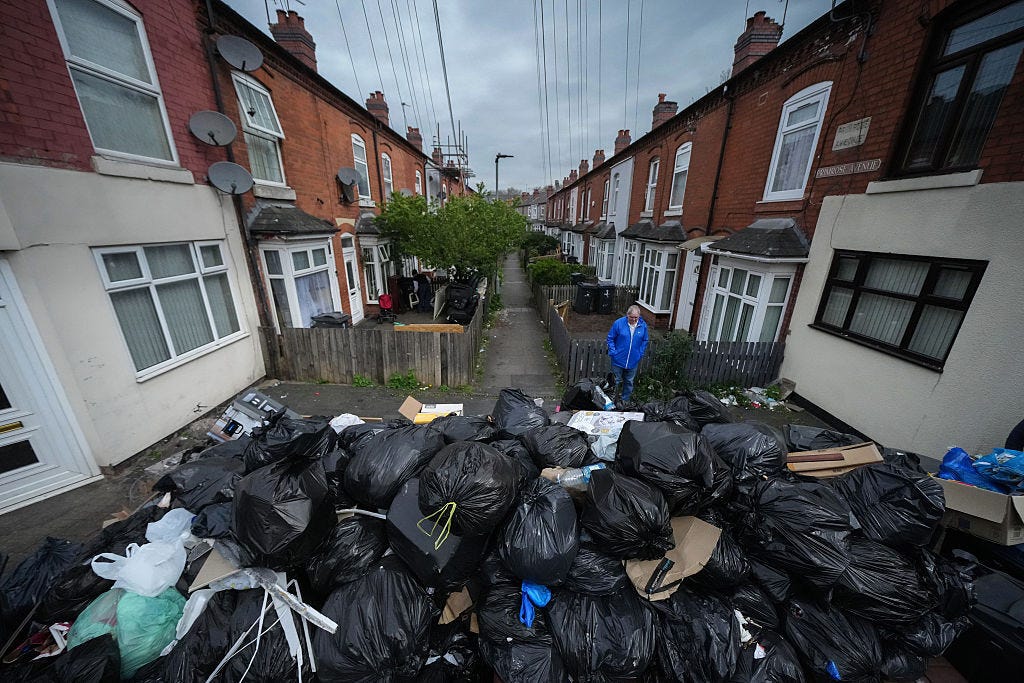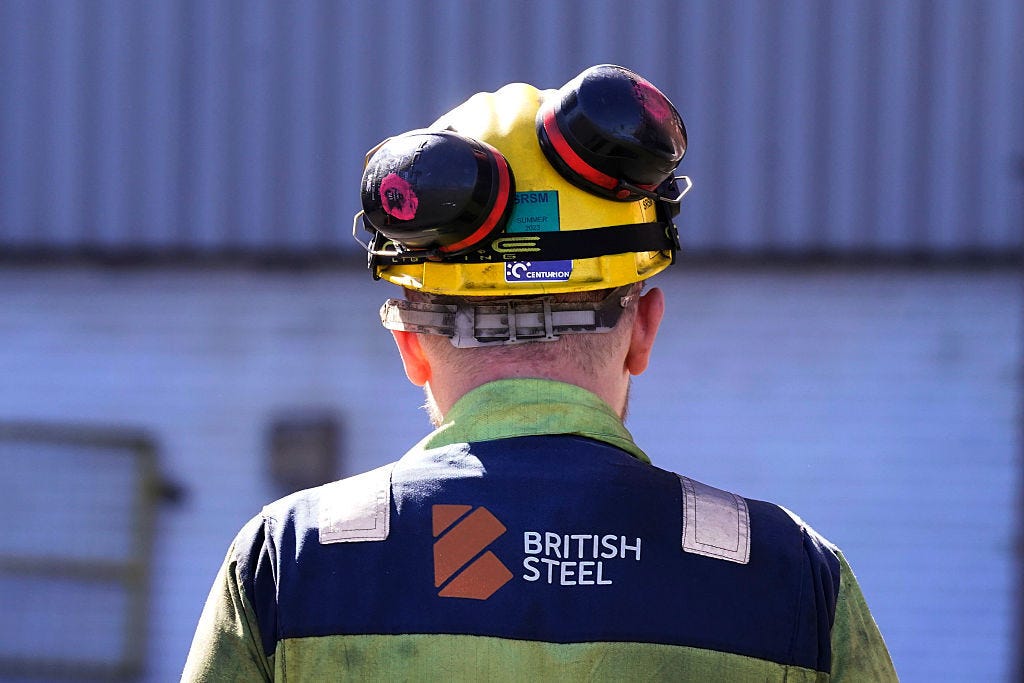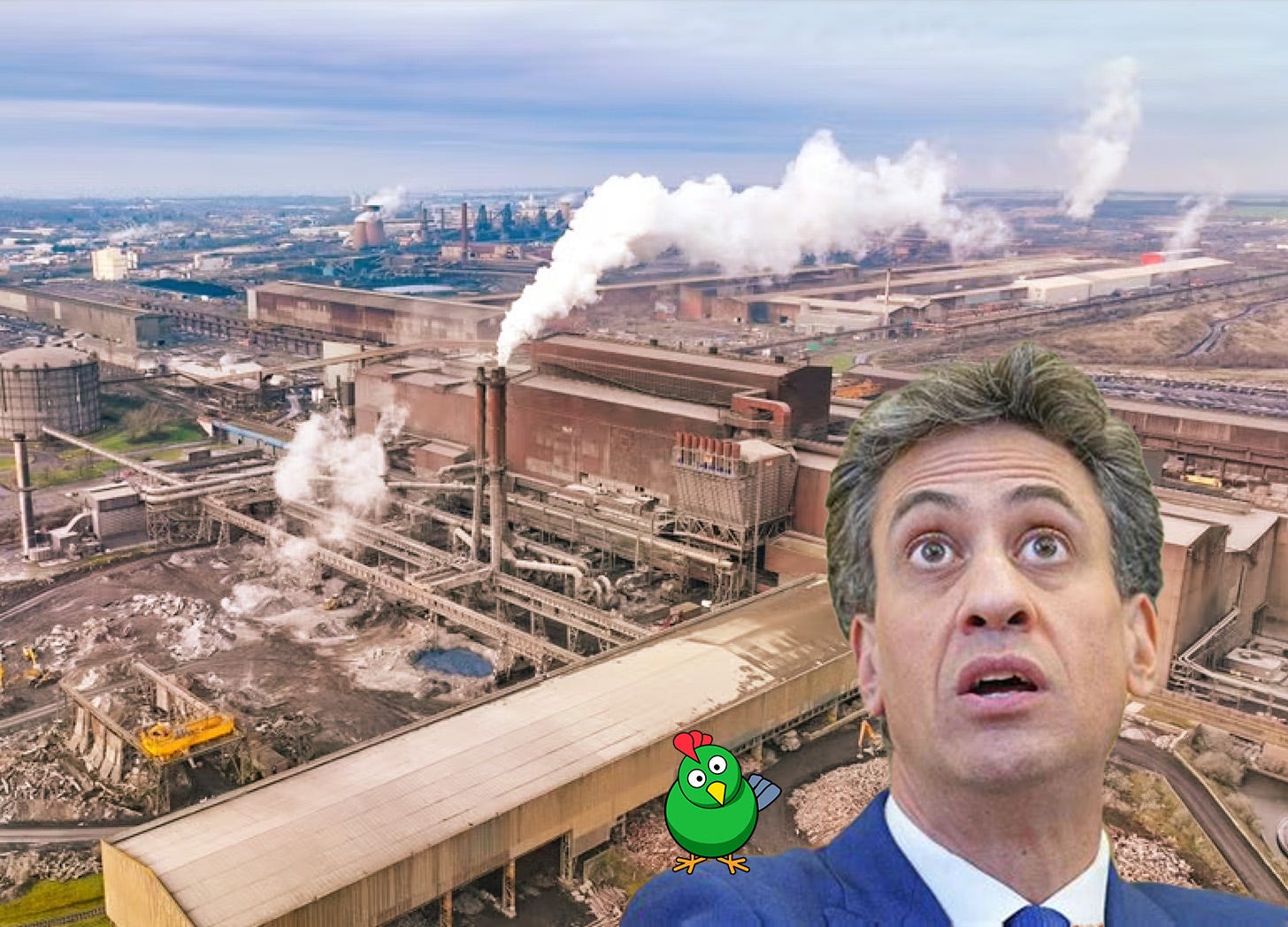Let Ed Run It
The British steel industry’s final days devolve into a cynical game of blamestorming.
“Farce is tragedy played at a thousand revolutions per minute.”—John Mortimer
Although the second-largest city in Britain traces its beginnings back to a small Anglo-Saxon hamlet in the 7th century, Birmingham didn’t become a thriving metropolis until the Industrial Revolution. Its location near the geographic center of England made it a logical hub for national rail and road networks. Known as the “city of a thousand trades,” Birmingham gained renown for innovation in manufacturing and engineering. At its apex in the 18th and 19th centuries, it was considered one of the most important industrial cities in the world.
Few cities serve as a more poignant marker of national decline than modern-day Birmingham—a predictable casualty of Britain’s economic mismanagement, particularly its disastrous energy policy. The city’s finances are in disarray, public services are being slashed, and worker strikes have become routine. Now, the beleaguered residents of Birmingham are quite literally being overrun by rats:
“It's everywhere you look: street corners, abandoned lots and local parks, although you tend to smell it before you see it. For six weeks, residents in Birmingham, the United Kingdom's second-largest city, haven't had their rubbish collected. Bin workers are locked in an industrial dispute with the city council, and have been on strike since March 11.
With household trash overflowing, locals—known colloquially as Brummies—have been dumping their waste anywhere they can. Now, mounds rubbish bags are strewn around the city, sparking public health concerns and a rodent infestation that's made global headlines. Every gust of wind carries the pungent reminder of a crisis for which there's no end in sight.”
The root cause of Britain’s decline to rump-state status is as easy to identify as it is difficult for most legacy media outlets to admit. Replace cheap and reliable energy with expensive and intermittent alternatives, and the cost of operating heavy industry explodes. Keep those costs elevated long enough, and global competition inevitably forces domestic industry into retreat. No large nation can sustain a thriving economy with expensive energy—there simply aren’t enough high finance jobs to offset the loss, and even those eventually migrate closer to where real production occurs. This tendency will only accelerate with the rise of artificial intelligence (AI), which is itself just a derivative of energy. As AI becomes central to global commerce, the pressure on energy vassals like Britain will intensify.
Perhaps the most predictable casualty of Britain’s insane energy agenda is the country’s steel industry, whose decades-long slide into irrelevance now appears headed for an imminent and inglorious conclusion. As we wrote last September in “Stop the Steel,” Prime Minister Keir Starmer’s catastrophic choice to appoint career politician Ed Miliband as Secretary of State for Energy Security and Net Zero—an oxymoronic title if ever there was one—was bound to be the final blow. We ended that piece with the observation that Miliband’s radical energy policies would make the decision to exit the steel business an easy one.
Barely six months later, the death throes of Britain’s once-great steel industry seem to be upon us:
“British Steel has announced plans to close its two blast furnaces in Scunthorpe, making Britain the only G7 country unable to manufacture its own steel.
Jingye, the Chinese steel group that owns the plant, blamed Donald Trump as it announced plans to shut key operations, putting up to 2,700 jobs at risk. It said the ‘imposition of tariffs’ had made the blast furnaces and steel making operations ‘no longer financially sustainable.’ The closures signal the end of steel production in the UK after more than 150 years…
Jingye said it has invested more than £1.2bn to maintain operations since 2020 but said losses have ballooned to around £700,000 a day.”
As convenient as it is for a Chinese company to pin its years-in-the-making decision on Orangemanbad’s latest moves, the British government’s response to the fiasco has been even more cynical. Rather than examine its own policies for their role in the collapse, UK political leaders are lobbing wild accusations and threatening drastic measures—all in a bid to avoid reckoning with the consequences of basic physics. In other words, they’re doubling down on denial. Like rubberneckers crawling past a smash-up on the motorway, let’s head to London for the details and consider what might come next.
To fully appreciate contemporary events, brief lessons in both chemistry and history are in order. British Steel is one of the few companies still active in the UK’s steel industry, though its peers are rapidly transitioning to electric arc furnaces (EAFs). EAFs are hailed as “green” because they primarily use electricity to recycle scrap steel into finished product, and Miliband has been at the forefront of efforts to convert the country’s remaining blast furnaces in line with his electrify-everything-and-power-it-with-wind-and-solar agenda. One major complication with EAFs, however, is their inability to produce steel that meets the stringent specifications required for certain military applications—standards that, for now, only virgin steel from traditional blast furnaces can satisfy.
How the brand “British Steel” ended up in Chinese hands is itself an interesting saga. The original British Steel ceased to exist in 1999, merging instead with a Dutch company that was later acquired by Tata Steel. In 2016, Tata sold the Scunthorpe plant to Greybull Capital, a private investment group that specializes in turnarounds, which revived the British Steel moniker. By 2019, the newly relaunched company entered insolvency when rescue talks with the government broke down. After scouring the world for new buyers, an agreement was reached to sell the company to the Jingye Group in November of 2019. A deciding factor in favor of Jingye was its commitment to invest £1.2 billion to revive the company’s competitiveness.
The trigger for the current crisis was a collapse in negotiations between Jingye and the British government over subsidizing British Steel’s transition to EAF technology. Unfortunately for all involved, operating EAFs in the UK remains a fundamentally unprofitable venture—even with generous government backing—thanks to prohibitively high electricity costs. Rather than continue pouring private and public money into a losing proposition, Jingye opted to shut things down, halting orders for the coking coal required to keep its blast furnaces running. Once a blast furnace cools, restarting it would demand significant capital, rendering Jingye’s move effectively irreversible.
Left with the prospect of having no operating blast furnaces in the country, the British Government was forced into urgent action:
“The UK government took effective control Saturday of Britain’s last remaining factory that makes steel from scratch from its Chinese owners, after lawmakers approved an emergency rescue.
Prime Minister Keir Starmer summoned lawmakers for the unusual Saturday sitting, only the sixth since World War II, to back a bill primarily aimed at blocking British Steel’s Chinese owners, Jingye Group, from closing the two massive blast furnaces at its Scunthorpe plant in the north of England that are key in the steelmaking process.
The bill, which was debated over several hours and which is now law after being given royal ascent [sic] by King Charles III, gives Business Secretary Jonathan Reynolds the power to direct the company’s board and workforce, ensure its 3,000 workers get paid and order the raw materials necessary to keep the blast furnaces running.”
This is where things take a turn for the surreal (emphasis added):
“Government officials and British Steel staff are in a desperate race to save its blast furnaces after what ministers believe was a plot to sabotage the Scunthorpe plant by its Chinese owners…
Once the furnaces are turned off, it is practically impossible to bring them back online, and officials believe British Steel’s Chinese owner Jingye had been planning to let the raw materials run out in a bid to sabotage the plant, shuttering the blast furnaces and making the UK reliant on Chinese exports of so-called virgin steel.
Luke de Pulford, executive director of the Inter-Parliamentary Alliance on China, warned: ‘It is an explicit strategy of the Chinese Communist Party to undermine the industrial base of foreign countries.’”
While we are certainly no fans of how the Chinese conduct business, the sheer audacity here is staggering. Steel production fundamentally requires three inputs: iron ore, coking coal, and cheap energy. Britain, in its climate crusade, now proudly mines none of the first two and just celebrated the closure of its last coal-fired power plant. Meanwhile, China continues to derive more than half of its primary energy from inexpensive thermal coal—a cornerstone of its industrial dominance. A historical comparison of thermal coal production between the two countries makes the disparity glaringly obvious.
For its part, China has fired back with characteristic fury, accusing British politicians of acting out of “arrogance, ignorance, and a twisted mindset.” The row comes at a delicate moment in Sino-British relations, as both nations grapple with the economic consequences of President Trump’s escalating tariff war. China was the UK’s fifth-largest trading partner in 2024, and any meaningful deterioration in the relationship would inflict disproportionate harm on Britain.
The affair also exposes the hollowness of Starmer’s tough talk and lofty ambitions to rearm Britain in support of Ukraine’s fight against Russia. A single 155 mm artillery shell contains around 40 kilograms of steel, and Russia is firing tens of thousands of them daily. Meanwhile, the deepening synergy between China and Russia forms a military-industrial bloc of immense scale. A bankrupt nation with crumbling heavy industry isn’t likely to keep either adversary awake at night.
We close with a humble suggestion for Starmer: relieve Miliband of his current duties and put him in charge of British Steel. Not only would it mark one of the greatest addition-by-subtraction trades in British political history, but it would also give Miliband a rare opportunity to grapple with the practical consequences of the very policies he has long espoused.
Alternatively, send him to Birmingham and assign him to trash duty.
“♡” this piece to make Ed the Rat King!








This article alone was worth my yearly subsciption cost. No doubt most 'reporting' on this will merely amplify elements of the farce. Thanks for the beautifully wordsmithed look behind the curtain.
It is truely frightening to think these leaders are true believers of the Church of Carbon. Their seeming delusion must be a power calculation, cynicism, control..... all bizarre but somehow less frightening.
Of course at this point for Britian is might not matter- as the witching hour is upon them.
Breathtaking to see how quickly a civilization can go from thinking it should rule the world one century then deciding it can't even rule itself -- committing economic, cultural, and demographic suicide without much organized resistance. Energy is good. Production is good. Energy use per capita is a decent measure of progress. Unfathomable that a country would just unilaterally disarm production in the name of a vapid new secular religion and more or less close up shop. And they might love Net Zero but Net Zero doesn't love them back. The benefits literally net zero as China picks up the slack and then some, shifting the benefits east while offering zero benefits to the climate.